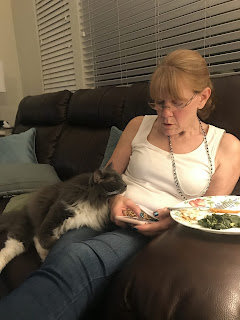You may not be aware of it, but there is a silent war going on today in many American churches. Some call it the Worship-War others just see it as a difference in opinion. My church offers both styles to their members (two are traditional and two are contemporary). A church I attended for many years prior to moving to this church was clearly on the side of the traditional (or liturgical) style. At that church, they still used acolytes, followed a liturgy which included the pastor chanting his part to the congregation and using only the hymnal for their music source (unless it was the choir singing). At my current church they do much of the same except the pastor does not chant and much of the liturgy is gutted for a simpler and shorter worship form.
There seems to be very little middle ground in the worship wars. You are either for strict adherence to the traditional form or you view a more 'anything goes' form. Each side views the other with a little animosity. The liturgical side views the contemporary as falling into false-teaching and no one being held accountable. The contemporary view the liturgical as stiff and unbending and pushing people away rather than bringing them in.
What these two sides hold in common is that both sides feel theirs is more "spiritual". So who is right and who is wrong? Answer: both/neither (in my opinion). It depends on what you call "spiritual". To the traditional, spiritual is connecting with the ancient ways. It's doing it the way Peter and Paul would have do it if they were here with us. If they wore robes, then we should wear robes. If they chanted, then we should chant. To the contemporary, spiritual means "feelings". If you feel closer to God through singing a certain song then that is more spiritual. It's not what the words MEAN, but more about how they make you FEEL. In a way, both sides have this in common they just have different ways of getting there.
Let's look at the traditional side first. An argument made by some on their side is that our early church was more "spiritual" and we should follow their guidance in worship. But is that really true? Does everything in the liturgy stem from a spiritual center or purpose? All too often we have a limited view of what the early church was like. We don't put ourselves into their 1st century sandals. They were not stupid people who were by their nature more spiritual. They were highly intelligent and practical. They may have not had the science we do, but they knew what worked and what didn't. They knew that putting a speaker up on a platform that was higher than the crowd would aid in projecting his voice over the heads of the crowd. They knew that putting a curved wall behind the speaker would help amplify his voice too. How do we know this? Because early churches and synagogues were designed this way. We also don't take into account that paper and printing was expensive. They did not have hymnals like we do and so to lead a group in singing would require a simpler form which could be followed along. You take ANY song and have a singer stand in front and break up the song into smaller pieces that the crowd can repeat back to him. This is what they did and when you hear it, it sounds a lot like a liturgy. Having the worship leader singing their part also makes sense in the early church because your voice carries a lot farther when you sing than when you yell. Singing occurs in the chest cavity, yelling occurs in the voice box. I am sure this did not go unnoticed by the early church either.
So why should we keep all these old methods when new technology makes them obsolete? We have electric amplification now, hymnals and electric lighting. Shouldn't liturgy, chanting and candles go by the way side? Yes and No. Yes, if you think it creates a stumbling-stone to bringing in new believers (the mission of the church). No, if you are just doing it to be different or keep up with the 'jones'. The reason to keep these ancient ways is not because they are more "spiritual" but because they bring us into Christ's church triumphant. We come to church wanting to connect with the first church. We want each Sunday to be as if it was the FIRST Easter Sunday. Jesus resurrection was not 2000 years ago, but TODAY! We in the Lutheran church view the church on earth and the church in heaven as ONE church. We see Jesus' words to his disciples as his words to us as well as if we are sitting on the shoreline with him in the boat. We connect our voices with theirs in the worship and holding on to the "old ways" serves us by helping our minds feel as if were are right there with them. It's more psychological than it is spiritual. Take for example if I took my wife to see Hamlet being performed and when we got their the stage was bare with no props, the actors wore street clothes and they spoke with American dialects. Shouldn't I be racing fore the door to get my money back? Of course I would! The same goes for the church and it connecting us with the "host of all believers". The robes, the candles, the music, the altar all serve us in worship. As Jesus said, "That Sabbath was made for MAN, not man for the Sabbath". The service serves US and not us serving the service.
The contemporary side of the war views the old with much contempt. They seem to ask the question, "Why should we be held back by ways that no longer fit with the modern era?" Yes, it is true that we don't have just 5 string harps to lead us in worship now. We have guitars, and electric pianos and drum sets. We have wireless microphones, fancy lighting and even fake smoke if you want it. To them, old is just old and not more spiritual. People today reject the argument: "We've always done it THIS way!". Music should keep up with the times and serve as a replacement for "secular music". In some ways, I do see what they are saying. We do need to connect with our culture at some level and meet people where they are at. Often they quote Jesus words to the Samaritan women, "God wants people to worship him in SPIRIT and in TRUTH". From this, they believe that if your SPIRIT leads you to worship in a certain way, then that is OK because that is what God is looking for. The problem is defining what is "spirit" and what is "truth". If you define spirit as your feelings then you will come away with a different style of worship than if you define spirit, as God's presence in your life and in your worship of him. Personally I don't think Jesus is opening the door for "anything goes" here. First of all, in the context of his words to the Samaritan woman, they are debating the issue of "where to worship". Samaritans believed it was on a mountain in Samaria you were to worship God and the Jews say it is in Jerusalem. Jesus corrects her by telling her that Salvation is from the Jews and the right place for worship is in Jerusalem ... for now.... but a time will come when it won't be a place but the reason for worship. This is where the TRUTH comes in. It's not some wishy-washy New Age spiritualism Jesus is talking about, but a REALITY and a TRUTH that solidifies our faith and worship of God. The truth that we are all horrible sinners deserving of death, but God has saved us by dying for us and taking 100% of the punishment on himself. To me, as long as contemporary worship leaders hold to this TRUTH they will be fine, but too often this is not the case. Too many churches choose to water down this message and not confront the sin that is very real in our lives.
I do want to also say I have great concern for the WORDS that are sung in contemporary worship. Music is art, but I believe words have meaning and should come from God's word. Historically, from the days of King David, song has served as a way for God to bring his truth to our hearts and lives. God knows that there is something about singing that resonates with our minds in ways we don't fully understand. Words that are sung are more easily remembered. Words that are sung are internalized in ways words we read are not. So, music leaders in churches need to take their roles with urgency and respect. As in the movie Spider-Man, "With great power comes great responsibility". Song leaders must make sure their words are in keeping with the Gospel and in keeping with the Faith. Historically this has been the direction of many of the great hymn writers of the past. Some hymns would pull from a single verse while others managed to pull several verses from God's word together and serve as a teaching aid to God's people. Sadly, this is not the path of many modern Christian music writers. One song I heard in a church (and later on the radio) took a single non-biblical phrase and repeated it OVER and OVER and OVER again. The words "mind-numbing" came to mind when I heard it. Am I saying all songs should just come exclusively from the Psalms? No. But we do need to hold Christian artists to a higher standard. (actually it's not just a Christian music problem but also very much present in secular artists too). Just because you label yourself an "artist" does not preclude from being held to a high standard of quality. We do the artist (and ourselves ) no service by applauding every song that comes out of their mouth. There is no shame in asking them to "Go back and try again!" If you don't like the song your "praise-band" performed or it was impossible for you to participate in then you owe it to them to let them know.
What contemporary churches get "right" is their willingness to meet people where they are at spiritually much like Paul did with the Greeks on Mars Hill. It may seem odd to some that people want a church that doesn't feel like "church" (which I think translates to old and stuffy). Maybe its a product of the YouTube culture and wanting to be "entertained". I don't really know, but I do know we must not let culture limit our ability to reach out to them. This is what they get right. If they can receive the gospel thought fancy graphics on big TV screens then that is what they do. If it's offering ways for them to connect with each other outside of church, then they do that as well. Most people are not into "sewing circles", "LWML" or "Ice Cream Socials" anymore and want instead "Running/Cycling groups", "Yoga classes", "Drone clubs" and the like. Some wag their heads at this and call it "marketing", but even traditional churches "market themselves" when they put a sign out front with their name and denomination clearly shown. Of course church members should come more than just connection. Hopefully the spirit will lead these people to want a more meaningful relationship with Jesus Christ over time and they will move beyond spiritual "milk" as Paul talks about.
What should the Church do?
What is needed today is BOTH sides to EMBRACE the other in LOVE. We need to hear Paul's words in Romans 14,
5 One person considers one day more sacred than another; another considers every day alike. Each of them should be fully convinced in their own mind. 6 Whoever regards one day as special does so to the Lord.
We could easily substitute "
day" or "
method of worship" and it would speak volumes to our situation today:
5 One person considers one way of worship more sacred than another; another considers every way of worship alike. Each of them should be fully convinced in their own mind. 6 Whoever regards one way of worship as special does so to the Lord.
We need to accept all forms of worship as special and necessary and not put unnecessary restrictions on them. In Paul's day, Jewish-Christians wanted to control who worshiped by adding additional requirements like celebrating various Jewish high festivals. In a sense, they wanted to convert the Gentiles not only to Christianity but also to Judaism as well. Of course, you can see how they must have felt. They saw their heritage as a blessing and wanted the new Gentile converts to "enjoy" those blessings as well. But that was not how it was perceived or received by them. In some ways we do this today. We don't just want to make believers in Christ, but also what we consider to be our variety of Christian. Not everyone is a lover of Bach or liturgical style. Bach's music may not be in your taste, but that should not be a reason you should not come to church. You may like the message, but if the worship style puts you to sleep or makes it difficult for your children to participate you might think about going somewhere else that doesn't. The world is changing whether we like it or not and we need to adapt so we reach the world with the Good News! We should not put "stumbling stones" (in ancient times stones were placed in a path to a house to cause people you don't want coming in the night to 'stumble on') in the way of people coming to Christ, even if those 'stumbling stones' are stones we like having.
But contemporary worshipers need the traditionalists as well. They need them to help guide them and keep them from straying into teachings that are not in line with our faith. Not all Christian music is "good" Christian music. Music needs to be edifying and educational. Worship needs to help train the believer in doctrine and faith. The traditionalists serve the purpose of keeping the standard. For the traditionalist, the benefit of using the liturgy/hymnal is that you don't have to concern yourself so much with the problem of false teaching because all that has been done for you. But the contemporary worship leader is left all to their own vices. They are left to make all these decisions all by themselves. While this can be freeing, it can also be terrifying. Traditionalists can help in these decision making processes by helping review song choices or methods of worship to keep things in check. Traditionalists can also serve as a mirror to the contemporary worship leader. Too often, contemporary worship falls victim to "concert mentality". It too easily morphs into being singer-centric and not worship-centric. The leader can sing the song, but the congregation is incapable of following along and ends up sitting as a concert-goer rather than singing along.
Maybe the church will end its worship wars and begin finding common ground once again and focus their energies on reaching our world with the Good News of Jesus Christ.













